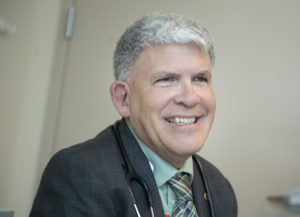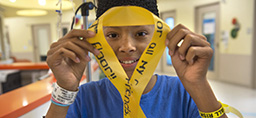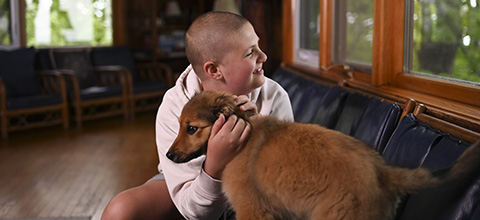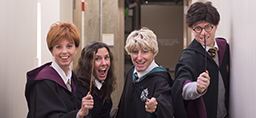Pediatric cancer treatments continue to change at an amazing pace, leading to better patient outcomes.
Many recent advancements owe credit to the evolution of personalized medicine.
Personalized medicine is the practice using an individual’s unique genetic profile to guide decisions in the prevention, diagnosis and treatment of a disease.

For many, these newer treatments could mean living a longer and healthier life.
James Fahner, MD, medical director for philanthropy education and provider well-being at Corewell Health’s Helen DeVos Children’s Hospital, answered several common questions and shared his insight into the future of precision medicine.
How has precision medicine evolved?
Pediatric oncology practice has changed dramatically in the past several years, Dr. Fahner said.
“Precision medicine touches the lives of our patients and families on a daily basis,” he said.
He said his team is finding new specific targets and therapies which in some cases help avoid traditional treatments and their side effects.
“There are tumors that used to require very intensive surgery, radiation therapy or chemotherapy to help control a tumor’s growth. And now we’re seeing select cases where precision medicine has completely changed the care regime,” he said.
“When we are fortunate enough to find the right target and to have the right ammunition, it can help us do things we have never been able to do before,” he said.
What can you do now that you once were not able to?
Dr. Fahner said the most important things are those that his team no longer needs to do.
“When we can save a family time in the hospital or unnecessary treatments, we are always so grateful,” he said. “The physical cost of cure for children has always been too high and as pediatricians we are always aware of how fragile and vulnerable children are at these critical stages of growth and development.”
He said to expose children to major surgeries and radiation treatments, including brutal combinations of chemotherapy drugs, is something that would never have been a first choice.
“It was the therapy that was effective, but always came at too high a cost,” he said.
He noted short-term side effects such as hair loss, nausea and low blood counts, but also long-term side effects including reduced heart, lung, liver or kidney function, or equally concerning, an impact on learning or cognitive function.
“For us, the miracle of precision medicine is what we won’t have to do in the future.”
How have outcomes improved?
Dr. Fahner said childhood cancer outcomes continue to improve across the board.
“I remember the days when many childhood cancers were only holding at a 50:50 chance of survival or cure,” he said. “Now we have many examples of childhood cancers with 70, 80 and 90 percent cure rates. It’s miraculous.”
Dr. Fahner said he believes the treatment of childhood cancer is one of modern medicine’s miracle stories. But with the caveat that it has indeed come with a cost.
“We are grateful for the high cure rates, but for most this can also mean a very long and treacherous journey of two or three years with multiple hospitalizations, scans, bone marrow studies, radiation treatment, chemotherapy and more.
“If we could completely change the narrative of childhood cancer from a bazooka to a laser-focused approach … that would be our goal.”
What is one thing you thought you would never see happen during your career in medicine?
“One of the most gratifying things in our careers as oncologists is seeing our children come full circle into healthy accomplished young adults,” Dr. Fahner said. “You see it along the way when you are invited to graduation open houses or even wedding receptions.”
He said it’s also extremely gratifying seeing numbers of patients so deeply impacted by their care that they dedicate themselves to a career in childhood cancer.
“I have seen many past patients move on to become nurse practitioners, physicians or child life specialists,” he said. “All who once had successful journeys in treatment and want to dedicate their careers to helping children like themselves.”
How have patients noticed the enhancements and advancements in care?
Dr. Fahner said one of the most interesting things he has noticed is parents reporting fewer and less serious side effects post treatment.
“Often a parent will come to clinic and say their child had a little bit of an upset stomach after treatment,” he said. “And in my mind, I think, if this were only a few years ago, most of these side effects would have been much more severe.
“You realize how grateful you are to have the more manageable or routine experiences like an upset stomach instead of the extremes these children used to go through.”
He said another truly heartwarming change in patient care is that families, and clinicians, can confidently make plans from the beginning of fully expecting a cure.
“That’s a very different mindset from decades ago when the prognosis was guarded,” he said.
Now, he said, the entire tone and delivery of care has changed.
“For example, we will say ‘keep up on your schoolwork because you will be going to college and becoming a successful adult someday … who is completely cured of this cancer,’” he said.
Dr. Fahner now expects his patients to grow up, get married, have a family and lead normal adult lives post-treatment–outcomes not nearly as certain in years past.
How does this all positively impact patients?
“We want to make sure our children and families come through this journey as intact as possible,” Dr. Fahner said.
There is a lot that we can’t avoid or change, he said.
“But to the extent that we can, we aim to protect the child’s childhood as much as we can so that they will come through this really overwhelming and life-changing experience ready and able to face the next chapters of their life.”
Dr. Fahner said lately he has been reflecting on three decades of building the childhood cancer program at Helen DeVos Children’s Hospital.
“And much of the success of our program comes back to our emphasis on true team effort. We have our morning huddle every day and discuss treatment plans for families with particularly difficult diagnoses,” he said.
“Everyone always comes together with one purpose as a team. It really is the miracle of multidisciplinary care, and we are grateful to have all these amazing, dedicated team members available to our children every single day.”
 /a>
/a>
 /a>
/a>
 /a>
/a>